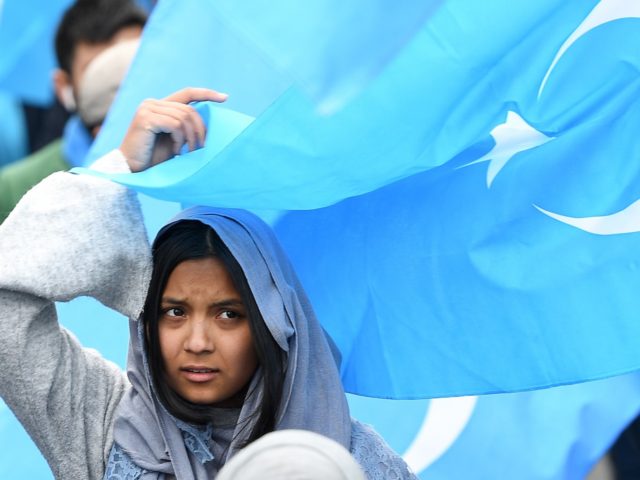Chinese officials on Tuesday referred to the massive detention camps holding roughly a million Muslim Uighurs in Xinjiang province as “vocational education centers,” and even “boarding schools,” and suggested the camps might “gradually disappear” once society “no longer needs them.”
The remarks were China’s latest effort to deflect international criticism of the camps, which have been denounced as a major violation of human rights and religious freedom.
Sam Brownback, the U.S. ambassador-at-large for religious freedom, spoke out against the “very tragic” and “horrific” situation in Xinjiang in a conference call with reporters on Tuesday.
The Chinese strongly objected to Brownback’s assertion from Hong Kong last week that Beijing is “at war with faith.” Brownback suggested the U.S. may respond with sanctions under the Global Magnitsky Human Rights Accountability Act.
The Chinese government insists it is taking reasonable steps to address security problems in the restless province and dismisses international criticism as an offense against China’s national sovereignty.
Xinjiang Governor Shohrat Zakir, himself a member of the Uighur minority, said on Tuesday that the number of “trainees” attending these “boarding schools” is far less than the one million commonly reported, although he did not provide a more accurate number.
“Some international voices say Xinjiang has concentration camps and re-education camps. These kinds of statements are completely fabricated lies, and are extraordinarily absurd,” he said.
He said Uighur religious freedom is fully respected, they are given food that complies with Islamic dietary laws, and they can even leave the camps to visit their families on weekends. Veterans of the camps have reported physical abuse, efforts to “deprogram” the religious beliefs of internees, and forced violation of dietary laws.
“Our education and training centers have been set up according to our needs. The students that come in to learn, it’s a dynamic number that changes,” Zakir insisted.
“As a whole, the number of people in the education centers should be less and less, and if one day society no longer needs it, these education centers can gradually disappear,” he predicted.
The Washington Post skeptically noted Zakir holds a largely ceremonial role as a spokesman for the Chinese government, while hardline Communist Party secretary Chen Quanguo – a veteran of China’s suppression of Tibet – calls the shots. Chen was at the same meeting as Zakir on Tuesday but did not answer questions about the camps.
The Post was also cynical about invitations from Xinjiang officials to visit the province, noting that journalists who attempt to file reports from Xinjiang are routinely kept under surveillance, intimidated, and forced to delete the pictures and video they shoot. The United Nations is currently attempting to send observers to the camps.
Dolkun Isa, exiled leader of the World Uighur Congress, challenged Zakir’s claims in a Tuesday interview with Nikkei Asian Review. Isa said the camps are “clearly an attempt to totally assimilate and control the Uighurs and other Turkic peoples in the region.”
“It is abundantly clear that this was never about terrorism. The Chinese government is using this excuse to try and justify its actions to the international community and to silence criticism of its human rights record,” Isa charged.

COMMENTS
Please let us know if you're having issues with commenting.